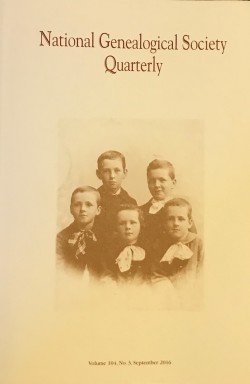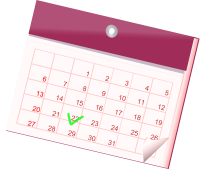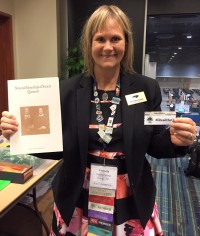Sep 2017
Reducing Risk by Using Original Sources
In a mere three pages in the September 2016 issue of the National Genealogical Society Quarterly, author Elissa Scalise Powell, CG, CGL, illustrates the risks genealogists run when they do not pursue original sources.[1] Sources fall into one of three categories: An original source is described by Elizabeth Shown Mills as “material in its first […]
Sep 2017
Genealogists and Books
On National Read a Book Day, celebrated 6 September 2017, the public was encouraged to spend the day reading. Many family historians need no encouragement to do that; books are an important part of every day. Genealogists use books for research and they read them to learn about records, techniques, history, society, laws, and much […]
Aug 2017
Modern Eyes, Old Records
We’ve all heard the expression that beauty is in the eye of the beholder. Viewers bring their individual interpretations and ideas to what they see. The phenomenon extends into everything that people look at, including historical documents used in genealogical research. Genealogists looking at sources created decades or centuries ago bring a modern-day point of […]
Aug 2017
The Sibling Connection
When faced with a challenging research problem, expanding the search to records of the subject’s family, friends, and associates frequently will bring a solution. One of the most effective paths is through a person’s siblings. If a person’s own records fail to name parents, a sibling’s records could directly state their names or offer clues […]
Jul 2017
Making the Most of an Index
An index is an index—or is it? Indexes can range from printed lists of alphabetized names to computer databases that allow users to pick and choose from several searchable fields. In her 2006 National Genealogical Society Quarterly article, “Job1 Davidson, Cooper in Baltimore, Maryland, and His Long Lost Descendants in Ohio and Indiana: Using Occupation and […]
Jul 2017
What? Write About Genealogy?
Yes! All genealogists can and should write about their work. Writing is part of everyday life. All of us make lists of things to remember and to do. Some keep journals about experiences and emotions. We communicate with others in emails, letters, cards, tweets, and posts on social media, and we complete forms and surveys. […]
Jun 2017
Stepping Toward a Solution
Beginners struggle with the task of planning and conducting efficient research, and the ready availability of online records and databases can actually add to the confusion. Would-be genealogists have easy access to information that may or may not relate to their own families. Many newcomers to genealogy spend hours at the computer gathering whatever scraps […]
Jun 2017
Calculating Dates and Date Ranges
Precision—genealogists know all about the importance of precision when it comes to citing sources, recording details, and interpreting records. But many genealogists are less particular when it comes to calculating and expressing estimated dates. Avoiding fuzzy computations could mean the difference between solving a research problem and facing a roadblock. Many records report age, usually […]
May 2017
Beyond Names, Dates, and Places
The bare essentials that a genealogist must know before starting a research project are name, place, and time period. While those basics may be enough to start searching, they are rarely enough to be able to separate relevant from irrelevant records or to allow genealogists to make sense of the findings. In general, the more […]
May 2017
Do You Read the Q?
Earlier this month, attendees at the National Genealogical Society’s annual conference in Raleigh, North Carolina, took to social media to proudly display ribbons proclaiming “#IReadtheQ”—that is, to say that they read the National Genealogical Society Quarterly. Reading the Q and other peer-reviewed journals is one of the best ways genealogists can learn about sources and […]









